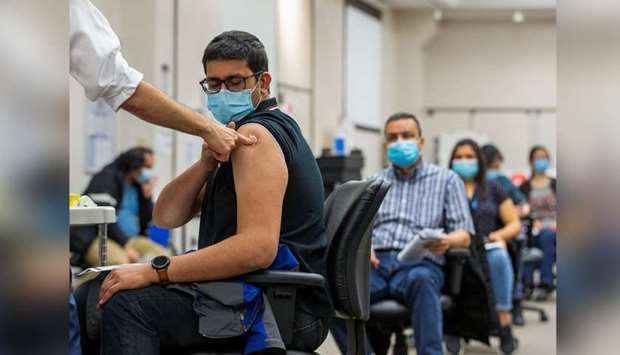Canada’s most populous province has announced plans to make coronavirus (Covid-19) vaccines more accessible and the federal government pledged emergency aid as authorities scramble to combat a worsening outbreak in Ontario.
The shift in strategy comes after the premier, Doug Ford, was forced into a U-turn over deeply unpopular new restrictions announced on Friday.
In response to mounting public pressure, Ontario announced late on Sunday that it would lower the age threshold to receive the AstraZeneca vaccine from 55 to 40.
Earlier on Sunday, the federal government promised it would help send nurses and doctors from other provinces to help in Ontario hospitals, where the intensive care unit (ICU) admissions continue to grow and doctors fear the province may soon begin triaging care.
“We are mobilising federal healthcare workers from across government departments to deploy to the frontlines in Ontario – and specifically the [greater Toronto area] – where the situation is most critical,” said Prime Minister Justin Trudeau. “There are provinces that have managed their healthcare capacity for their own local situation and have the ability to lend a hand to others.”
News of emergency federal aid and greater vaccine accessibility capped a tumultuous weekend for the governing Progressive Conservatives, which faced widespread public outrage over controversial new restrictions announced ahead of the weekend.
On Friday afternoon, Ford announced that police would have greater power to stop residents and issue fines.
The province also announced playgrounds would be closed.
The public outrage was swift.
Civil rights groups pledged to challenge the new rules, and doctors expressed disappointment.
“This has been an extremely upsetting and eventful day … we are about to go through what Italy & New York went through a year ago. I can’t believe we are at this place in Ontario today,” tweeted Rajiv Singal, surgeon-in-chief at Toronto’s Michael Garron hospital. “Neither of those places had warning. We had one full year to prevent this.”
A majority of police services in cities across the province tweeted that their officers would not use the new powers and mayors pledged to challenge the decision to close playgrounds.
On Saturday, the premier bowed to public pressure, tweeting that playgrounds could reopen.
His solicitor-general also said police will no longer have the power to stop residents to ask why they are out or request their home address.
New infection modeling from the province predicts Ontario could see as many as 10,000 new daily cases by the end of June if the current growth trajectory holds.
The province recorded more than 4,400 new cases yesterday.

(File photo) A young man get Covid vaccination in Ontario, Canada. (Reuters)
